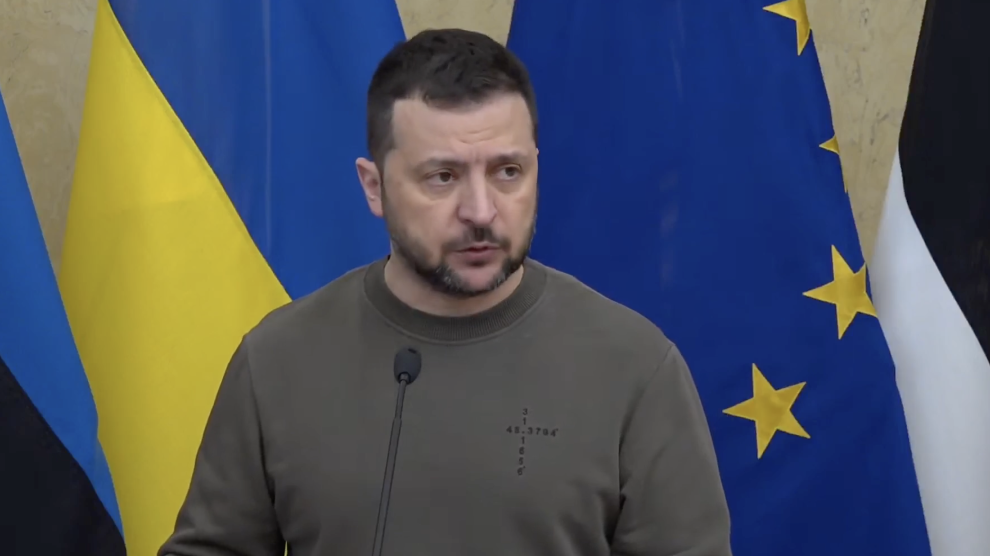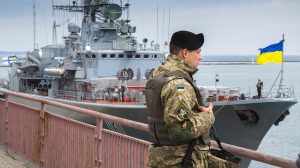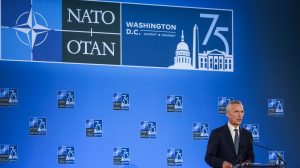Catch up quickly with the stories from Central and Eastern Europe that matter.
Russia’s war on Ukraine
President Volodymyr Zelensky said on Thursday that a ceasefire in Russia’s war against Ukraine would not lead to political dialogue, and would only benefit Moscow.
Speaking to reporters in the Estonian capital Tallinn during a wider tour of the Baltic region, Zelensky said any pause would risk allowing Russia to re-group and boost its supply of munitions “and we will not risk”.
“The pause would not lead to an end of the war, it would not lead to political dialogue with Russia or someone else… And thank God this is all decided in Ukraine and there will be no pauses to benefit Russia,” he said.
On his trip to Lithuania, Latvia and Estonia, some of his staunchest supporters in the European Union and the NATO military alliance, Zelensky hopes to push back against fatigue among Ukraine’s Western allies, secure more financial and military aid, and discuss Kyiv’s bids to join NATO and the EU.
The three Baltic states were the first Western nations to supply Ukraine with lethal weapons in the weeks before the Russian invasion in February 2022.
A Ukrainian air force official said on Tuesday that Russia’s recent escalation of missile and drone attacks is stretching Ukraine’s air defence resources, leaving the country vulnerable unless it can secure further weapons supplies.
“Intense Russian air attacks force us to use a corresponding amount of air defense means,” air force spokesman Yurii Ihnat told national television. “That’s why we need more of them, as Russia keeps increasing its (air) attack capabilities.”
As soldiers on both sides fight from largely static positions along the roughly 1,500-kilometre front line, recent Russian attacks have used large numbers of various types of missiles in an apparent effort to saturate air defense systems and find gaps in Ukraine’s defences.
Hungary this week made fresh demands to Brussels in exchange for lifting its veto on the European Union’s proposed 50 billion euros fund for Ukraine.
The fund, known as the Ukraine Facility, is meant to provide Kyiv with financial assistance between 2024 and 2027 to plug its ballooning public deficit, sustain essential services and pay for reconstruction efforts.
Under the original plan, the Facility was supposed to be already up and running, as Brussels has run out of financial aid for the war-torn nation.
But during a dramatic meeting of the European Council last month, Viktor Orbán used his veto to strike down the proposal, which is pegged to a wider review of the bloc’s common budget.
Ahead of a make-or-break Council meeting on February 1, Hungary has touted an idea to split the package into four annual envelopes, worth 12.5 billion euros each, according to diplomats with knowledge of the negotiations.
Hungary has also made an unrelated demand about the bloc’s Covid-19 recovery funds, the diplomatic sources said speaking on condition of anonymity. Hungary’s recovery and resilience plan is worth 10.4 billion euros, of which only 920 million euros have been released.
Other news from the region
Polish police on Tuesday arrested the former interior minister and deputy interior minister inside the presidential palace in Warsaw. Mariusz Kamiński and Maciej Wąsik were sentenced to two years’ jail last month for abuse of power when they led an anti-corruption office in 2007. The men, who were elected MPs for the Law and Justice party (PiS) in October, refused to recognise the court’s decision because President Andrzej Duda, a PiS ally, pardoned them for the crime in 2015. On Wednesday, Kamiński declared himself a “political prisoner” and began a hunger strike.
The family of a Serbian opposition leader who was allegedly beaten up while in detention say he has been left partly paralysed by the attack. In an assault that has fuelled fears about the future of democracy in the country, Nikola Sandulović’s family say he was taken from his home on January 3 after making an apology for crimes committed by Serbs against ethnic Albanians during the Kosovan war of independence in 1998 and 1999. On Wednesday, Sandulović’s daughter called for her father to be transferred to a civilian hospital from the military facility in Belgrade in which he was being held.
Bosnian Serbs in the Republika Srpska on Tuesday marked their self-proclaimed “national day”, disregarding condemnations and warnings that the holiday violated Bosnia’s constitution. The January 9 anniversary observes Bosnian Serbs’ 1992 declaration of their own republic in Bosnia. Bosnian Serb President Milorad Dodik attended the event along with other officials and the Russian ambassador to Bosnia. Celebrations were held although the “holiday” was deemed anti-constitutional by both Bosnia’s constitutional court and the Organisation for Security and Cooperation in Europe (OSCE).
Hungary’s industrial output dropped more than expected in November, sowing doubts about the pace of economic recovery from a recession. Industrial production fell for an 11th consecutive month last year, shrinking an annual 5.6 per cent compared with a 2.9 per cent drop in October, the Budapest-based statistics office said in a statement on Tuesday. Prime Minister Viktor Orbán has made it a priority to boost economic growth in 2024 after the European Union’s highest inflation rate crippled domestic demand and cut tax revenue, undermining the Hungarian government’s fiscal targets.
The European Commission is urging Google and other big technology companies to help dissident Belarusian media by promoting their stories higher than those published by pro-regime outlets, which opposition journalists argue are favoured by search algorithms. Belarusian journalists in exile have complained to the commission that content critical of the regime of Alexander Lukashenko is failing to reach target audiences, in part because of search algorithms used by Google, Meta and others, which they claim wrongfully take into account Lukashenko’s media censorship rules.
France accused Azerbaijan on Tuesday of holding a French national arbitrarily and demanded his immediate release after Baku’s envoy to France said the man had been arrested on suspicion of espionage. Ties between the two countries have been strained in recent months and have worsened since Azerbaijan took control of the Nagorno-Karabakh region in September. Azerbaijan’s ambassador to France, Leyla Abdoullayeva, told Reuters earlier on Tuesday the French citizen, Martin Ryan, was arrested on December 4 on “suspicion of carrying out acts of espionage”.
Hungarian Wizz Air on Thursday lost its fight against 36.66 million euros of rescue aid granted by Romania to airline Tarom four years ago, after the Court of Justice of the European Union (CJEU) backed EU regulators’ decision to approve the aid. The European Commission approved billions of euros in state aid to European airlines during the Covid-19 pandemic, much of which was subsequently challenged by rivals in court. Romania granted a loan to finance Tarom’s liquidity needs repayable after six months. The Luxembourg-based CJEU said the EU competition watchdog was right to clear the aid.
Trade between Afghanistan and Uzbekistan in 2023 increased sixfold year-on-year, hitting 266 million US dollars, a sign that engagement between the war-stricken nation and its northern neighbours is flourishing despite the Taliban’s ascendancy. Afghan news agency Tolonews cited an Industry and Trade Ministry representative in Kabul as saying that imports from Uzbekistan reached 239 million US dollars, while 27 million US dollars of goods went in the other direction. This pattern provides strong vindication for ongoing plans to construct a trans-Afghan railroad that would link Uzbekistan with Pakistan.
Kosovo’s deputy prime minister on Saturday welcomed a decision by Spain to recognise Kosovar passports five days after citizens of Kosovo were granted visa-free travel within the European Union’s Schengen zone. Deputy Prime Minister Besnik Bislimi said on Facebook that Spain’s recognition of passports issued by Kosovo was “more good news” for Kosovo. Spain is among five EU states that do not recognise Kosovo’s independence. The others are Greece, Cyprus, Slovakia, and Romania. However, all these states recognised travel documents issued by authorities in Kosovo.
Five people who had been trapped deep inside a flooded cave in Slovenia for more than two days because of high water levels were rescued on Monday. The hours-long rescue operation by a team of six divers became possible when water levels inside the Krizna Cama cave receded. “It is a day of happiness, it’s a day of life,” said Sandi Curk of the Slovenian civil protection service. Three tourists and two guides got stuck in the eight-kilometre cave system after heavy rainfall resulted in the subterranean waters rising fast.
Unlike many news and information platforms, Emerging Europe is free to read, and always will be. There is no paywall here. We are independent, not affiliated with nor representing any political party or business organisation. We want the very best for emerging Europe, nothing more, nothing less. Your support will help us continue to spread the word about this amazing region.
You can contribute here. Thank you.







Add Comment